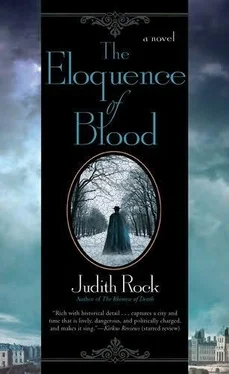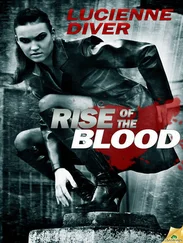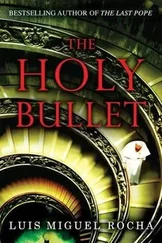Judith Rock - The Eloquence of Blood
Здесь есть возможность читать онлайн «Judith Rock - The Eloquence of Blood» весь текст электронной книги совершенно бесплатно (целиком полную версию без сокращений). В некоторых случаях можно слушать аудио, скачать через торрент в формате fb2 и присутствует краткое содержание. Жанр: Исторический детектив, на английском языке. Описание произведения, (предисловие) а так же отзывы посетителей доступны на портале библиотеки ЛибКат.
- Название:The Eloquence of Blood
- Автор:
- Жанр:
- Год:неизвестен
- ISBN:нет данных
- Рейтинг книги:5 / 5. Голосов: 1
-
Избранное:Добавить в избранное
- Отзывы:
-
Ваша оценка:
- 100
- 1
- 2
- 3
- 4
- 5
The Eloquence of Blood: краткое содержание, описание и аннотация
Предлагаем к чтению аннотацию, описание, краткое содержание или предисловие (зависит от того, что написал сам автор книги «The Eloquence of Blood»). Если вы не нашли необходимую информацию о книге — напишите в комментариях, мы постараемся отыскать её.
The Eloquence of Blood — читать онлайн бесплатно полную книгу (весь текст) целиком
Ниже представлен текст книги, разбитый по страницам. Система сохранения места последней прочитанной страницы, позволяет с удобством читать онлайн бесплатно книгу «The Eloquence of Blood», без необходимости каждый раз заново искать на чём Вы остановились. Поставьте закладку, и сможете в любой момент перейти на страницу, на которой закончили чтение.
Интервал:
Закладка:
Damiot snorted. “And if this priest has heard that the Society is being accused of her death?”
“I don’t know,” Charles said impatiently. “We’ll know what our lines are when he says his.”
“Nothing that sounds that simple ever is.” Damiot looked glumly at the dome of the Val de Grace convent coming into sight above a line of trees. “We take the next right-hand turning. Between Val de Grace and the Port Royal convent.”
They weren’t in open country yet, but the religious enclosures were surrounded by large gardens and orchards and the private houses were fewer. The wind had grown blessedly quiet, and as the sun climbed, shortening the shadows following them along the western edge of the road, Charles could almost imagine that there was warmth in the light. Almost, but not quite. He shifted the reins to his right hand so he could warm his numb fingers under his cloak.
When they turned, just before Port Royal, the road became a dirt track with gentle vine-covered slopes on its right, and flatter fields on the south side. Beyond the fields, which would be planted with rye and barley in the spring, was a cluster of low hills.
“That’s Mont Parnasse,” Damiot said. “Quite a comedown from the Greek Mont Parnasse, home of Apollo and the Muses, wouldn’t you say?”
“I hope the Muses and Apollo are wearing more than they normally seem to.” Charles was studying the track underfoot and as far in front of them as he could see. “Pere Damiot, the brother in our stable said that Flamme needs a good run. And so do I! We’ll wait for you where the track crosses the rue Vaugirard.”
“But what if this horse runs, too?” Damiot’s eyes were wide with fright. “What do I do?”
“Wrap your arms around his neck and don’t fall off,” Charles said heartlessly. “But he won’t; he knows you better than you know him.”
Charles gathered Flamme’s reins and shifted a little forward in the saddle. “Now for it, Flamme, mon brave!”
The horse leaped forward with no touch from Charles’s heels. The track poured past them like a river in flood, and wind scoured Charles’s face. The gelding’s black ears were pricked happily toward the rapidly approaching distance. Charles realized that he was laughing aloud for sheer joy at the speed, the wind, the perfect body that carried him, and his own blood was pounding in answer. He wanted to go on riding like that till the world ended. Flamme wanted to go on running like that, too, and when they reached the fortunately clear crossroad, it took all Charles’s strength and skill to pull the horse back to a canter, then a trot, and finally a stop.
Stroking Flamme’s sweating neck, he looked back along the track, where Boeuf was carefully carrying Damiot to meet them. As he waited, Charles set his horse walking up and down the Vaugirard road to cool him off. The first of the village’s hundred or so houses stood a little to the south, and the spire of the church, called St. Sauver, rose farther on, above a tight cluster of slate roofs on the left of the road. Vineyards spread out from the village in every direction, interrupted only by the little abbey of Notre Dame des Prez. Country quiet lay under the harsh cries of crows in the abbey trees, the soft lowing of village cows, and the thudding of hooves as Boeuf neared the end of the dirt track.
“You actually enjoyed that, didn’t you?” Damiot said wonderingly, as he pulled Boeuf to a willing halt. “I was terrified you would break your neck and leave me stranded out here with two horses.”
“Thank you for your pastoral concern, mon pere. Yes, I enjoyed that with all my heart! And body. And soul, too, I think.” He pointed at the houses. “And there is Vaugirard. Now we find the priest and ask for Paul Saglio.”
Damiot’s eyes went from the vineyards and fields to the crows. “How do we find the priest in this wasteland?”
Charles burst out laughing. “Do you see that big thing sticking up above the houses? Even in the country, that’s called a church spire. Where there’s a church, there’s a priest. Anyone would think you’d never been out of Paris!”
“Why would I leave Paris? Why would anyone leave Paris?”
But Damiot managed to turn Boeuf toward the spire and they set off. The road became a slushy village street bordered by houses with snow-covered roofs and full of the sounds of morning chores that take no note of holidays. Doors banged, well pulleys squeaked, dogs barked, mistresses shouted at servants, and wooden shoes, the ubiquitous sabots of rural France, clacked sharply over courtyard cobbles. When they came to the church, they reined their horses in and dismounted. It was small and old, and stood in a large cemetery. Charles eyed its age-blackened walls and the statues of the apostles around its arched door, and Damiot told him that they were made from Vaugirard’s own quarry stone, as were numberless houses and buildings in Paris. “And each apostle is framed in grapevines, as though they’re all standing in a vineyard-a nice touch in a wine village.”
Charles nodded, squinting at the foot-high figures and suddenly homesick on this day when families visited everyone they knew. “A very nice touch. We have churches decorated with vines at home, too.”
They tied their horses to an iron ring in the church wall and went inside. For a moment there was nothing but darkness, and they had to stand still until the holy water font and the altar swam out of shadow. What light there was came through small windows of colored glass set high in the walls. As they dipped their fingers into the font’s frigid water and crossed themselves, Charles saw that, unlike Louis le Grand’s chapel, this church had no benches at all, only stone seats around the edge of the nave. Which meant that, as in the old days, the congregation still stood through Mass, or knelt-or sat-on the stone floor, or on cushions brought for the purpose.
The smell of incense hung in the air, evidence of an early Mass already said. Charles went to the vestry door, but it was locked and no one answered his knocking.
“The house beside the church looks too big for a single man,” Charles said.
“He may live behind it.”
Damiot led the way into the sunlight. They untied the horses and led them down a dirt lane along the church’s north side and the cemetery wall. Where the wall turned, a black cat with a white feather stuck to its face sat on the angle, watching them, and beyond the cat stood a small stone house, its front bare to the lane.
Damiot stopped short and Boeuf, half asleep, nearly knocked him over. “Thatch?” Damiot stared in horror at the roof of a small lean-to wing built onto the side of the house. “Blessed Saint Joseph, I don’t think I’ve ever seen a thatched roof. Could a parish priest so close to Paris be this poor?”
“Well, the rest of the house is roofed in good slate tiles. But the church has a poor feel about it, too. I saw thatched roofs when I was in the army in the north.” Charles grinned ruefully. “And slept under them. Do you know what lives in thatch?”
“No, and I don’t want to. Did Pere Le Picart tell you this priest’s name?”
“No.”
As they approached the house door, someone moved at one of the tiny windows, but the door stayed shut. Charles knocked, waited, and was about to knock again when the door flew open. A tall elderly man in a stained cassock stared unhappily at them.
“God’s blessing,” he said, without much conviction. “What do two Jesuits want of a simple priest?”
“God’s blessing on you, mon pere, and a good new year.” Charles introduced himself and Damiot. “We are looking for a man who may be in your parish. His name is Paul Saglio.”
“Saglio?” The parish priest laughed without mirth. “And why-” He broke off as wings beat over his bald head and a white dove landed on his scalp. “No, no, ma petite Fontange, that is agony to a bald man, how many times must I tell you?” He reached up and the bird walked onto his finger.
Читать дальшеИнтервал:
Закладка:
Похожие книги на «The Eloquence of Blood»
Представляем Вашему вниманию похожие книги на «The Eloquence of Blood» списком для выбора. Мы отобрали схожую по названию и смыслу литературу в надежде предоставить читателям больше вариантов отыскать новые, интересные, ещё непрочитанные произведения.
Обсуждение, отзывы о книге «The Eloquence of Blood» и просто собственные мнения читателей. Оставьте ваши комментарии, напишите, что Вы думаете о произведении, его смысле или главных героях. Укажите что конкретно понравилось, а что нет, и почему Вы так считаете.












